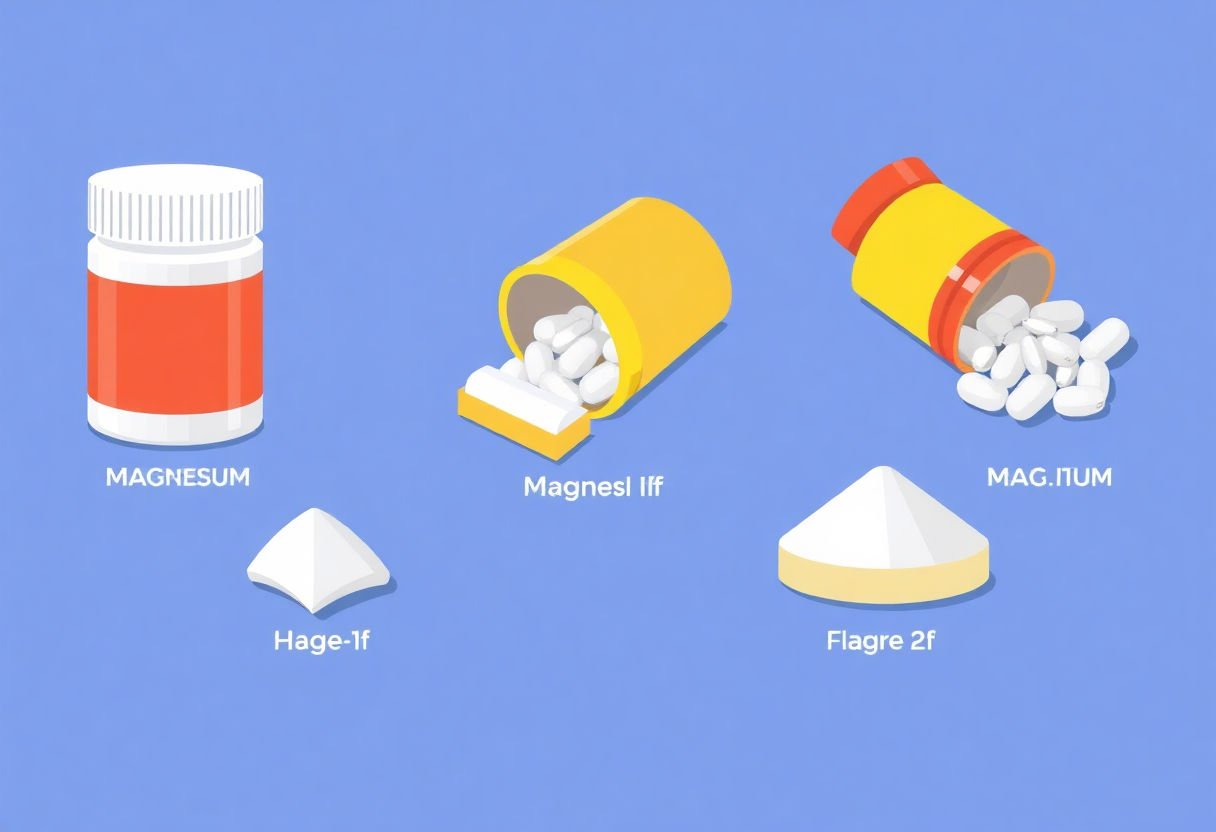Boost your health with magnesium complex. This supplement supports muscle function and bone health while enhancing mental clarity. Magnesium is key for energy and relaxation. It may help with certain health conditions. Learn how it aids nerve function and heart health. Discover how it benefits mental well-being by reducing stress and improving mood. Explore its role in maintaining strong bones. Understand the different types to find the right choice for you. Consider potential side effects and learn how to add magnesium to your diet. Dive into these topics for a healthier you.
Key Takeaways
- Magnesium complex aids muscle function and bone health for better physical well-being.
- It helps maintain energy levels and promotes relaxation, reducing stress.
- Magnesium supports mental clarity and can improve mood and sleep quality.
- Choosing the right form is key for addressing specific health conditions.
- Incorporating magnesium-rich foods enhances overall health benefits.
What is Magnesium Complex?

Magnesium complex combines different types of magnesium. Each type provides its own set of benefits. Magnesium citrate, for example, absorbs well and helps the digestive system. Magnesium oxide, on the other hand, supports bone health.
This blend offers a full range of health advantages. It helps balance energy. It also supports muscle function, making it useful for athletes. With a magnesium complex, you receive support for your heart and bones.
For mental health, the magnesium complex plays a big role. It can ease stress and may help your mood. Many people take it to help with sleep. When combined, the different forms in a magnesium complex can enhance these effects.
Think of magnesium as a multi-tool for your body. Each form is like a different tool in the multi-tool, ready to tackle a specific job. With magnesium complex, you get a complete package. This makes it popular as a supplement choice for many.
Taking magnesium complex ensures you support your body in many ways. This makes it a great choice for anyone looking to boost their health. From athletes to those needing a better night’s sleep, the complex can make a difference.
To sum it up: magnesium complex offers diverse benefits, all packed into one supplement. It supports both physical and mental health, fitting well into a balanced lifestyle.
Health Benefits of Magnesium

Magnesium plays a key role in how the body works. It affects muscles, nerves, and bones.
Nerve Function: This mineral helps send messages between the brain and body. Think of it like a postal service that delivers mail. Without it, communication gets scrambled. Magnesium keeps the signals clear.
Muscle Health: Muscles need magnesium to relax and contract. Picture squeezing a rubber ball; it takes strength and effort. Magnesium makes this process easy. It helps reduce cramps and keep muscles flexible.
Bone Strength: Some people mistake calcium as the only nutrient needed for strong bones. But bones need magnesium too. It helps absorb calcium properly. This promotes healthy bone growth and density.
Heart & Blood Pressure: Magnesium helps regulate blood pressure. Think of it as a traffic cop that guides cars. It keeps blood flowing smoothly through arteries. This supports heart health and may lower the risk of heart problems.
Additional Benefits:
- May help control blood sugar levels
- Plays a role in energy production
- Can improve exercise performance
Magnesium can support many aspects of health. It acts like a multitasker in the body, helping in many areas. Getting enough through diet or supplements boosts overall wellness.
For anyone wanting better nerve, muscle, bone, or heart health, magnesium deserves a close look. A simple change can mean big benefits.
Effects on Mental Health

Magnesium plays a big role in mental health. It acts like a soothing balm for the brain. People say it can improve mood and even make you sleep better.
Reduces Stress: Magnesium helps calm the mind. When stress builds up, this mineral can step in like a shield. It helps lower the stress hormone called cortisol. So, you feel less anxious.
Improves Sleep Quality: Got trouble sleeping? Magnesium might help. It relaxes muscles and calms nerves. This makes it easier to drift into a good night’s sleep. Imagine turning off all the noise before bedtime.
Enhances Mood: Feeling low sometimes? Magnesium could lift your spirits. It helps balance chemicals in the brain. These chemicals affect how happy you feel. Magnesium acts like a natural mood booster.
Supports Anxiety Management: Some people use magnesium to manage anxiety. Think of it as a gentle helper for nerves. It may not replace other treatments, but it adds extra support.
Helps with Depression: Studies suggest magnesium might help with mild depression. It works with other treatments to give your brain what it needs. Like a vitamin for your mind.
A magnesium complex might be what you need during tough times. It works best as part of a healthy diet. Remember, magnesium makes a difference you might not see but can feel.
Magnesium for Bone Health

Magnesium plays a big role in keeping bones strong. It helps make bones harder and more robust. Like a key, magnesium opens the door for calcium to join the bones, making them stronger. Calcium often takes the spotlight, but magnesium is just as important. They work together to keep our bones healthy and firm.
Osteoporosis is a big word for weak and brittle bones. Magnesium can help keep this from happening. Think of magnesium as a shield, protecting bones from becoming too soft.
Here are some key points:
-
Bone Mineralization: Magnesium supports the process of building strong bones. It helps the skeleton absorb calcium.
-
Bone Density: Regular intake of magnesium keeps bones from becoming thin and weak.
People with low magnesium might face more bone problems as they age. They might feel their bones cracking or hurting more often. Doctors often suggest magnesium supplements for those with low levels.
In food, magnesium lives in nuts, seeds, and green vegetables. Eating these foods can give the body a natural boost of this important mineral. Also, drinking water rich in magnesium can help.
Staying on top of magnesium intake is a good step towards keeping bones healthy and strong. This mineral is a friend to bones and a partner to calcium. It helps create a solid foundation for a healthy life.
Choosing the Right Magnesium Supplement

When choosing a magnesium supplement, you face many options. Picking the right one can seem tricky. Each type offers different benefits. Here, we break down the most common forms to help you choose.
Magnesium Citrate: This type absorbs well in the body. It can be helpful if you deal with constipation, as it may act as a mild laxative. It’s gentle on your stomach, much like a kind friend.
Magnesium Oxide: This form contains more magnesium than others. If you need a higher dose, it might suit you. However, it does not absorb as easily. Use it if advised by a healthcare professional.
Magnesium Glycinate: Known for calming properties, this one may help with anxiety and sleep. Think of it like a warm blanket on a chilly night.
Magnesium Malate: For those struggling with fatigue, this form provides long-lasting energy. It combines magnesium with malic acid, which you find in many fruits. Picture a boost that comes from eating an apple.
Magnesium Chloride: Often used in topical solutions, it’s great for skin health. Apply it to your skin and allow it to soak in. It’s like a spa treatment you can do at home.
Before starting any magnesium supplement, talk to a healthcare provider. Consider your health needs and how you respond to each type. Whether it’s for relaxation, energy, or gut health, there is a magnesium type that fits your life. Stay informed and choose wisely for better health support.
Potential Side Effects and Precautions
Taking magnesium complex supplements can boost health in many ways. But like any supplement, it may have some side effects. Most people can take magnesium without issues. Yet, some might feel differently.
Common Side Effects
Some people might feel an upset stomach. This can lead to diarrhea or nausea. If you take too much magnesium, these symptoms are more likely.
Serious Side Effects
In rare cases, a person might feel muscle weakness. They could feel very tired or face trouble breathing. If any of these happen, contact a doctor right away.
Things to Be Careful About
Certain conditions might affect how you take magnesium. If someone has kidney problems, they should talk to their doctor first. This is because magnesium leaves the body through the kidneys. Poor kidney health can lead to high magnesium levels.
Who Should Consult a Doctor?
- People with kidney problems
- Those taking other medications
Recommended Dosages
It’s best to follow the label on the supplement. Dosages vary based on age and health needs. For kids, doctors can suggest the best dose.
In short, magnesium can help many people. But everyone is different. Watching for side effects and talking to a doctor can make the experience better.
Incorporating Magnesium into Your Diet
Eating magnesium-rich foods can improve your health. You find magnesium in many everyday foods. Almonds and spinach are great choices. Both pack a punch with magnesium. Enjoy them as snacks or in salads.
Whole grains like brown rice and oats help too. They provide magnesium and fill you up. Try switching from white rice to brown rice at dinner.
Leafy greens are a must. Spinach isn’t the only option. Kale and Swiss chard work well. Add them to soups or stews. Easy and tasty.
Seeds also carry magnesium. Pumpkin seeds and sunflower seeds make great toppings on yogurt. Or enjoy them alone for a quick boost.
Don’t forget about beans. Black beans and kidney beans add protein and magnesium. You can add them to tacos or side dishes.
Here are some simple options:
- Almonds: Eat as a snack or add to oatmeal.
- Spinach: Mix into smoothies or omelets.
- Pumpkin Seeds: Sprinkle them on a salad.
- Brown Rice: Use it under stir-fry or curry.
Use these foods to maintain healthy magnesium intake. Adjust your meals with small changes. You can even use supplements if food isn’t enough. Talk to a doctor before starting supplements to avoid any problems. Eating well and checking with professionals keeps you on the path to better health.
Conclusion
Magnesium complex offers vast health benefits. It supports muscle function, bone health, and mental clarity. By understanding these benefits and choosing the right form, one can enhance overall well-being. For those seeking natural ways to manage stress and improve health, magnesium can be a powerful ally. Embrace this knowledge and integrate magnesium into your daily life. It may lead to a healthier, more vibrant future.
Frequently Asked Questions
What are the main benefits of taking magnesium complex?
Taking magnesium complex boosts muscle function and supports your bones. It also helps maintain normal energy levels and can improve your mood.
How much magnesium complex should I take daily?
Most adults need around 300 to 400 milligrams per day. Check with a health expert for advice based on your personal needs.
Can magnesium complex interact with other medications?
Yes, magnesium might affect how other medicines work. It’s a good idea to talk to your doctor before starting it.
What should I do if I experience side effects from magnesium complex?
If you feel side effects like upset stomachs or diarrhea, stop taking it and ask your doctor for advice. This helps you find a dose that’s right for you.
Are there specific forms of magnesium complex that are better?
Different forms like magnesium citrate or oxide work for different goals. Talk to a healthcare expert to decide which one fits best with your health needs.
